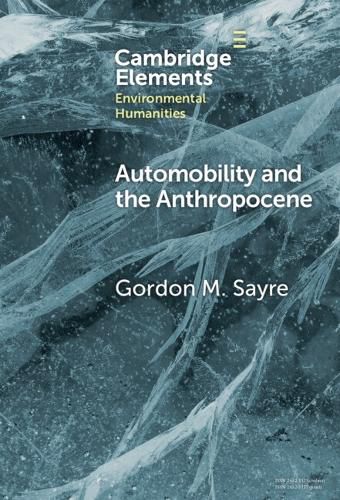Readings Newsletter
Become a Readings Member to make your shopping experience even easier.
Sign in or sign up for free!
You’re not far away from qualifying for FREE standard shipping within Australia
You’ve qualified for FREE standard shipping within Australia
The cart is loading…






The automobile has transformed Earth's habitats and humans' habits since the 1890s, when it, this Element argues, began the Anthropocene. Climate change now motivates efforts to reduce greenhouse gas emissions, of which cars and trucks account for at least 10 percent. Shifting to electric vehicles is not enough; one needs to better understand the power cars hold over humans. Environmental humanities scholars examine human/machine hybrids but have ignored the most obvious example. Humans driving cars are social agents constituting a civil society of automobility in roadscape environments. This Element traces the evolution of cars from horsecars, carriages, and bicycles, and the influence of Henry Ford and Alfred P. Sloan on labor standards and consumer behaviors. As the car industry pushes high-tech autonomous or self-driving vehicles, it relies on futuristic fantasies and false promises. The ills of automobility cannot be solved with new products that only intensify human dependence upon cars.
$9.00 standard shipping within Australia
FREE standard shipping within Australia for orders over $100.00
Express & International shipping calculated at checkout
The automobile has transformed Earth's habitats and humans' habits since the 1890s, when it, this Element argues, began the Anthropocene. Climate change now motivates efforts to reduce greenhouse gas emissions, of which cars and trucks account for at least 10 percent. Shifting to electric vehicles is not enough; one needs to better understand the power cars hold over humans. Environmental humanities scholars examine human/machine hybrids but have ignored the most obvious example. Humans driving cars are social agents constituting a civil society of automobility in roadscape environments. This Element traces the evolution of cars from horsecars, carriages, and bicycles, and the influence of Henry Ford and Alfred P. Sloan on labor standards and consumer behaviors. As the car industry pushes high-tech autonomous or self-driving vehicles, it relies on futuristic fantasies and false promises. The ills of automobility cannot be solved with new products that only intensify human dependence upon cars.